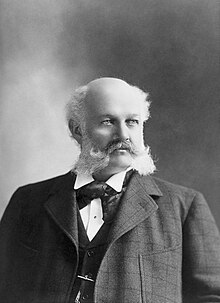Career
Nordenfelt was born in Örby outside Kinna, Sweden, the son of a colonel. The surname was and is often spelled Nordenfeldt, though Thorsten and his brothers always spelled it Nordenfelt, and the 1881 Census shows it as Nordenfelt. The family home in that year was Leinster Lodge on the Uxbridge Road, Paddington in west London.
Thorsten worked for a Swedish company in London from 1862 to 1866 and migrated to England in 1867 when he married Emma Stansfeld Grundy.
Thorsten Nordenfelt and his brother-in-law started a small business to trade Swedish steel for British rails in 1867. Later on he founded Nordenfelt Guns and Ammunition Company, ltd to develop a machine-gun designed by Helge Palmcrantz that would be referred to as the Nordenfelt gun. His company also designed a range of anti-torpedoboat guns in calibres from 37 to 57 mm, that were produced in Erith, Kent, Stockholm and Spain. Under pressure from Rothschild and Vickers his company merged with Maxim's in 1888 to form The Maxim Nordenfelt Guns and Ammunition Company.
After a personal bankruptcy Nordenfelt was forced out of the Nordenfelt-Maxim company in 1890 and left England for France, where his new company, Société Nordenfelt, designed the eccentric screw breech used on the French 75. Legal action followed (Nordenfelt v Maxim, Nordenfelt Guns and Ammunition Co Ltd) over a non-compete clause Nordenfelt had signed.
In 1903 he returned to Sweden and retired.
In 1902 a public house named after Thorsten Nordenfelt was built at 181 Erith Road, Erith just along from the Gun and Carriage works of Vickers, Sons and Maxim (previously Maxim Nordenfelt Guns and Ammunition Company) . Named 'The Nordenfelt Tavern' it was built to the design of Jonathan G. Ensor (1852/3-19??), architect for brewer Watney Combe & Reid

